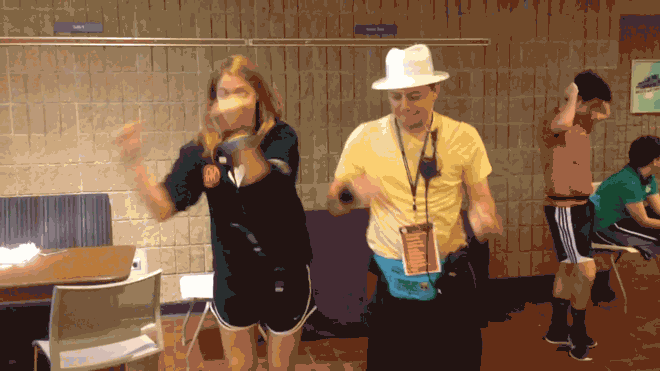DM executive co-chairs Arielle Miller and Kevin Harris took a break from their busy schedule and sat down with NBN and The Daily Northwestern during Block 7 to talk about how the weekend is going.
NBN: How’s it going so far?
KH: We’re excited. We’re in the homestretch now. Once you get past lunchtime you can see the light at the end of the tunnel and we’re certainly there now and I think the energy is certainly up in the tent from what I can tell.
AM: The energy seems so good. It’s so fun.
KH: So, yeah, we’re feeling really good. We’re excited and it’s also a little bittersweet that you can see the end in sight. We’ll see, we’ve got a couple house left.
NBN: What is the hardest part of this weekend?
AM: I think it’s keeping everyone up, right? Because it’s just a really long time and it’s hard for any person to stay really energetic and motivated that long, but it’s just reminding everyone why we’re doing it and bringing it back to who we’re raising money for. I think the heroes arriving just now gave everyone a huge burst of energy because it makes it so much more tangible. These kids are right from the south side of Chicago and that sometimes the kick in the pants dancers need to really get pumped and excited.
KH: Yeah, there are definitely a lot of moving parts this weekend, but I think we came in with a solid plan and we were ready to go. So, you would think coordinating logistics and all of that would be the most challenging thing, but I would say for the most part that’s all moving pretty smoothly.
AM: And that’s a testament to our executive board.
The Daily: So this year is obviously a little bit different in terms of the cause you’re supporting with the increased service component. How do you think that has translated into today and what impact do you think that has had?
KH: I think that was something we were excited about when we selected Blessings in a Backpack. To have that service component in addition to the philanthropy really gave us the opportunity to engage non-dancers in a new way and to get them involved. Maybe if they don’t feel like they can fundraise the $400 or if they don’t want to dance for the full 30 hours it’s still a way that they can give back to the organization and still unite around the same cause. And even for the dancers it became a great way to get to know the beneficiary, really understand and see the impact that they’re making on a weekly basis.
AM: I think the fact that it just costs the $2.63 to provide a whole weekend of food for a kid that sometimes gets shared with their whole family is really incredible in this year’s Dance Marathon because whether you’re a dancer that has raised $20 and has $20 to give or whether you’re giving $200, you’re still making such a significant impact because the smaller increments go such a long way. That’s very cool and something we’re really excited about.
KH: We’ve also tried to acknowledged the service hours and the bags that we’ve packed and we can’t even measure everything in terms of the number we put up there.
The Daily: How has hunger as an issue compared to something medical brought out a different side of DM?
AM: This type of different cause has brought out an incredible opportunity for DM to practice an increased advocacy because one thing we talked about with hunger is that it really is silent or it is invisible, whereas a lot of the sicknesses that we may have fought for before were very visible. When you look at a kid and you see him smile or you see him dancing on stage you can’t tell how long it has been since they had their last meal and because you can’t tell, unfortunately, a lot of people don’t know how urgent this problem really is. So we’re drawing a whole year’s worth of fundraising and a whole year’s worth of efforts towards this what we call “silent epidemic.” I think we’re literally giving a voice to those that otherwise wouldn’t speak up or ask for help or wouldn’t know who to ask for help.
KH: And to some extent, almost everyone knows, to an extent what it feels like to be hungry even if it’s only for a couple hours and missing one meal. Maybe they haven’t had that 65-hour experience, but maybe they know what that general feeling of hunger is and that really gives people a chance to relate to a small degree. They take for granted maybe their own food in their daily lives and how important food is to their well-being and feeding their dreams.
AM: And, for instance, one of the speakers in there was talking about how a little girl came up to her this week and said, “Because of Blessings, I can fall asleep.” She said, “What do you mean?” and she said, “Because my stomach doesn’t growl anymore I can fall asleep.” So I was even thinking this is the first time I feel it has been even a little bit easier for a large portion of the tent to put themselves in the hero’s shoes and imagine what you might feel when you’re hungry a half hour before dinner and if that was prolonged for an entire weekend. That’s something that is very powerful and not a lot of Northwestern students may have been exposed to that before and that is why I think it really goes back to that advocacy piece.
NBN: Ok, last question: What is your go-to dance move?

Editor's note 3/5 8:30 p.m. This article was updated to include the participation of the Daily in this Q&A session.